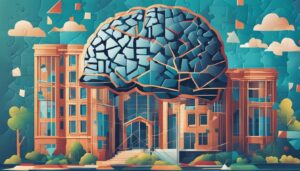Hello there! I’m excited to take you on a journey into the fascinating world of psychology, where we will unravel the mysteries of the mind and explore the concept of a mental set. Mental sets are an essential component in understanding how our brains think, problem-solve, and make decisions.
Put simply; a mental set is the framework or mindset we use to approach and solve problems. But, there’s much more to the concept than meets the eye. In this article, we’ll delve deeper into mental sets, their functions, and the implications they have on our mental agility.
Key Takeaways:
- Mental sets are a fundamental concept in cognitive psychology.
- They influence our problem-solving and decision-making processes.
- Understanding mental sets can provide valuable insights into our own cognitive processes and those of others.
- By enhancing mental flexibility, we can break free from rigid mental sets and tap into our full cognitive potential.
- Mental sets play a significant role in shaping our thoughts and behaviors, but we have the power to use them to our advantage.
Understanding Mental Sets
As a copywriting journalist, I am endlessly fascinated by the mysteries of the mind and how they shape our behaviors and decisions. This is where cognitive psychology comes in, and mental sets play a key role in this field of study.
So, what exactly are mental sets? In simple terms, they are the frameworks or patterns of thinking that we use to approach problem-solving and decision-making tasks. Mental sets can be beneficial in that they allow us to quickly and efficiently apply familiar methods and strategies to similar problems. However, they can also limit our thinking and lead to rigidity, preventing us from considering alternative perspectives and creative solutions.
Understanding mental sets is crucial for enhancing our problem-solving and decision-making skills. By analyzing our thinking patterns, we can identify any limiting mental sets and work to overcome them. This not only improves our cognitive abilities but also helps us to approach challenges with a more open and creative mindset.
In cognitive psychology, mental sets are closely linked to problem-solving and decision-making. By recognizing our mental sets and how they influence our thinking, we can improve our ability to approach complex problems and make more informed decisions.
So, how exactly do mental sets impact problem-solving and decision-making? Mental sets can influence the strategies we use to approach a problem and the solutions we consider. For example, if we have a mental set for using a specific problem-solving strategy, we may continue to apply it even when it is not effective for a particular problem. This can limit our thinking and prevent us from considering more effective alternatives. Similarly, if we have a mental set for making a certain type of decision, we may overlook other factors that could be important.
Overall, understanding mental sets is crucial for cognitive flexibility and problem-solving. By recognizing our mental sets and actively working to overcome them, we can enhance our cognitive abilities and approach challenges with a more open and creative mindset.
Characteristics and Types of Mental Sets
As we’ve established, mental sets can manifest in various ways and exhibit different characteristics.
Rigidity in Mental Sets
Rigidity is a common characteristic of mental sets, as they can limit our ability to consider alternative solutions. A rigid mental set refers to a fixed way of thinking that does not allow for flexibility or adaptation to new situations. This can lead to a narrow-minded approach to problem-solving and decision-making, as we often rely on familiar strategies or solutions rather than exploring new, creative options.
Problem-Solving Strategies
Mental sets can also influence the problem-solving strategies we use. For example, if we have a mental set that favors deductive reasoning, we may overlook other strategies such as inductive reasoning or trial-and-error methods. By recognizing our preferred problem-solving strategies, we can begin to break free from mental rigidity and explore a wider range of approaches.
Functional Fixedness
Functional fixedness is a type of mental set that occurs when we are unable to see an object’s potential uses beyond its intended purpose. This can be a significant barrier to problem-solving, as we may overlook creative solutions that require us to think outside the box. For example, if we are given a hammer, we may only consider its use for driving nails, rather than considering alternative uses such as cracking nuts or opening a can of paint.
Perceptual Set
Perceptual set is another type of mental set that influences our perception of the world around us. It refers to our tendency to interpret information in a way that supports our expectations, assumptions, and preconceptions. For example, if we are told to look for a red car, we may only notice red cars and overlook other colors. This can be a significant barrier to effective communication and problem-solving, as we may overlook important details or alternative perspectives.
By understanding the characteristics and types of mental sets, we can begin to recognize where our own mental sets may be limiting our thinking and problem-solving abilities.
Factors Influencing Mental Sets
Our mental sets are shaped by a plethora of factors, including prior experiences, cultural influences, and cognitive biases. These factors can influence our thinking patterns, leading to cognitive rigidity or narrow perspectives that limit problem solving and decision-making processes.
Prior experiences significantly impact the formation of mental sets. The lessons we learn from previous experiences inform our future problem-solving strategies. If we encounter a problem similar to one we have previously solved, we tend to approach the new problem in the same way. While this can be helpful in certain situations, it can also lead to cognitive rigidity and hinder our ability to find new solutions.
Cultural influences also play a significant role in shaping our mental sets. Different cultures have unique values, beliefs, and norms that can affect how individuals approach problem-solving and decision-making. For example, some cultures may favor collective problem-solving, while others may prioritize individual approaches.
Cognitive biases also contribute to the formation of mental sets. These biases, which can result from our own perceptions and experiences, can lead to selective thinking and prevent us from considering alternative solutions. Confirmation bias, for instance, causes us to seek out information that confirms our preexisting beliefs while ignoring contradictory information.
By understanding the factors that contribute to the formation and reinforcement of mental sets, we can become more aware of our own thinking patterns and those of others. This awareness can help us to appreciate diverse perspectives and approaches to problem-solving, and ultimately, enhance our cognitive flexibility.
Enhancing Mental Flexibility
Now that we understand the concept of mental sets and how they can limit our problem-solving abilities, it’s time to explore strategies for breaking mental patterns and enhancing mental flexibility.
Divergent thinking is a powerful tool for unlocking creativity and breaking free from rigid mental sets. This type of thinking involves generating multiple solutions to a problem, rather than settling for the first idea that comes to mind. By forcing ourselves to think beyond the obvious, we can challenge our mental habits and develop new perspectives.
Additionally, embracing creative problem-solving techniques can help us overcome mental barriers and approach problems with a fresh mindset. Some examples of creative problem-solving techniques include brainstorming, mind mapping, and lateral thinking. These methods encourage us to think outside the box and consider unconventional solutions.
It’s important to note that enhancing mental flexibility requires practice and persistence. Breaking mental patterns can be difficult, but the benefits are well worth the effort. By cultivating a willingness to embrace new ideas and challenge our preconceptions, we can tap into our full cognitive potential and approach problems with greater creativity and effectiveness.
Unleashing the Power of Mental Sets
As we’ve explored in this article, mental sets are a fascinating and complex concept that can play a significant role in our thoughts and behaviors. By understanding mental sets, recognizing the various types and factors influencing them, and actively working to enhance our mental flexibility, we can harness their power to overcome challenges, think more expansively, and lead more fulfilling lives.
But how can we put this knowledge into practice and truly unleash the power of mental sets? Here are some tips:
Challenge Your Mental Patterns
One of the most effective ways to break free from rigid mental sets is to consciously challenge our mental patterns. This can involve intentionally thinking about a problem from a different perspective or approaching it in a new way. By doing so, we can train our minds to be more flexible and adaptable.
Cultivate Divergent Thinking
Divergent thinking is a type of thinking that involves generating multiple ideas or solutions to a problem. By cultivating divergent thinking skills, we can become more adept at breaking out of mental ruts and approaching problems with fresh perspectives.
Embrace Creative Problem-Solving Techniques
Creative problem-solving techniques, such as brainstorming or mind mapping, can also help us tap into our mental flexibility and generate innovative solutions. By incorporating these techniques into our problem-solving processes, we can strengthen our mental agility and unleash the full power of our mental sets.
In conclusion, mental sets are a fascinating concept that can offer valuable insights into our cognitive processes. By understanding, recognizing, and actively working to enhance our mental flexibility, we can tap into the power of mental sets and lead more fulfilling lives. So go forth, challenge your mental patterns, cultivate divergent thinking, and embrace creative problem-solving techniques – your mental agility will thank you for it.
FAQ
Q: What is a mental set?
A: A mental set refers to a habitual way of thinking or problem-solving that is shaped by our previous experiences and assumptions. It can be seen as a cognitive framework that influences the way we approach and solve new problems.
Q: How do mental sets affect our thinking patterns?
A: Mental sets can impact our thinking patterns by creating a tendency to approach new problems in the same way we have approached similar problems in the past. This can limit our ability to consider alternative solutions and hinder creative thinking.
Q: What are some characteristics of mental sets?
A: Mental sets can display characteristics such as rigidity, where we become stuck in a particular problem-solving approach, and functional fixedness, where we struggle to see alternative uses for objects beyond their traditional functions. Perceptual sets, on the other hand, influence the way we interpret and perceive information based on our expectations and biases.
Q: What factors influence the formation of mental sets?
A: Several factors contribute to the formation of mental sets, including prior experiences, cultural influences, and cognitive biases. Our past experiences shape our mental frameworks, while cultural influences and cognitive biases can further reinforce certain ways of thinking.
Q: How can we enhance mental flexibility and break free from rigid mental sets?
A: To enhance mental flexibility, it is important to break free from rigid mental patterns. This can be achieved by cultivating divergent thinking, which involves generating multiple solutions to a problem, and embracing creative problem-solving techniques. By actively challenging our mental sets and seeking new perspectives, we can foster more flexible thinking.
Q: What is the significance of mental sets?
A: Understanding the concept of mental sets and actively working to enhance our mental flexibility can have profound effects on our lives. By harnessing the power of mental sets, we can overcome challenges, think more expansively, and ultimately lead more fulfilling lives.





